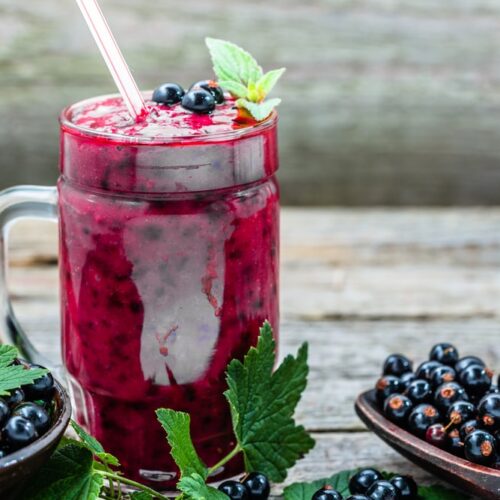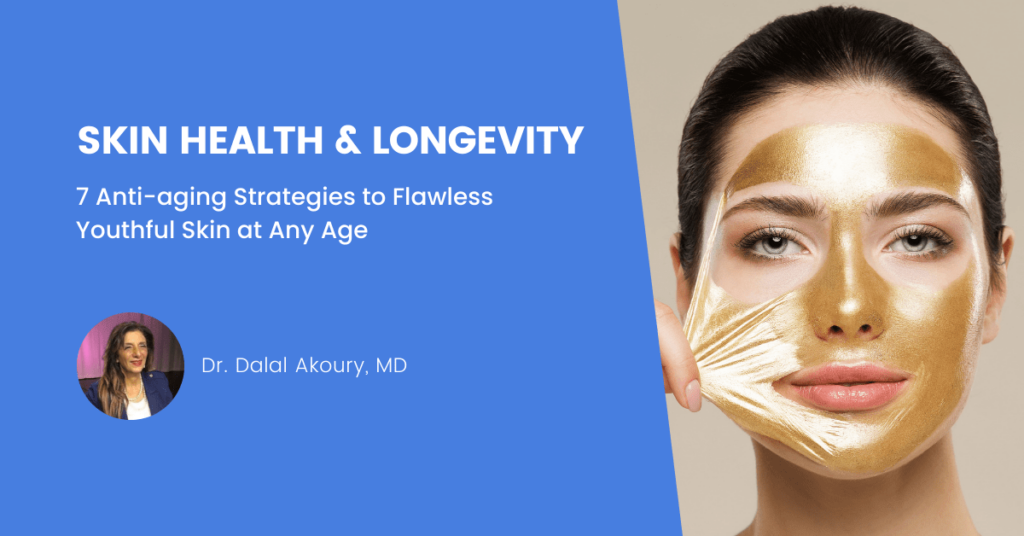- How Daily Stress Affects your Hormones and Longevity - August 13, 2022
- 5 Surprising Hidden Stressors That Are Making You Age Faster - August 13, 2022
- 7 Anti-aging Strategies to Flawless Youthful Skin at Any Age - May 10, 2022
7 Anti-aging Strategies to Flawless Youthful Skin at Any Age
Dr. Dalal Akoury, M.D, anti-aging medicine doctor specializes in skin health, shares the main causes of premature skin aging, warning signs to watch for, and practical tips for a healthy beautiful skin at any age.
I like to think of anti-aging more in terms of restoring function and optimizing the entire system. I see skin aging as a perpetuation of beauty or aging with grace, rather than denying or fighting aging. With proper attention, we can minimize risk factors that can cause premature aging and take steps that can help protect and improve our skin’s health and appearance. We can all have beautiful healthy skin at any age.
Know the main causes of skin aging
Just like aging in general, skin aging, to some degree, is unavoidable. There are various natural aging mechanisms that occur as we age. Sooner for some people, and for some lucky individuals, later.
Certain factors, however, can accelerate skin aging and have a significant effect on the way you look. Some of these factors can make you look much older than you are. The leading causes of skin aging may include:
- Excessive sun exposure
- Smoking
- Poor nutrition
- Environmental toxins
- Hormonal imbalances
- Chronic stress
- Gut issues
- Dehydration
- Harmful skin care products or routines
- Limited blood flow
- Underlying medical conditions
Is my skin aging too fast? Common signs of premature skin aging
The primary distinction between normal and premature aging is the timeline. When indicators of aging appear earlier than expected, this is known as premature aging. With premature aging, a person’s biological age is older than their chronological age.
Several visible signs can indicate premature skin aging:
- Lack of elasticity or firmness
- Thin skin
- Dark spots
- Dark, under-eye circles
- Dryness
- Uneven skin tone
- Discoloration of the skin
- Lack of shine
- Hypopigmentation (patches of skin that are lighter than overall skin tone)
- Hyperpigmentation (patches of skin that are darker than overall skin tone)
- Skin inflammation
Skin aging may be different between men and women
While both men and women experience skin aging, women tend to have more damage to their skin than men. For example, as women age, their skin seems to lose more of its water content than men. It is essential therefore, to pay extra attention to hydration.
Becoming mindful of these risk factors can help you take the right actions, protect your skin, and slow down skin aging. Some of these include:
- Perimenopause and menopause. Women face a drop in their estrogen levels in perimenopause which reduces collagen production. The result is a loss of firmness and elasticity, and more damage to the skin. Men on the other hand, have relatively stable low levels of estrogen throughout life.
- Alcohol consumption. We have all heard this before, if we choose to drink, it’s important to do so in moderation. For males, moderation is no more than two drinks per day, and for females, no more than one drink per day.
So, when one chooses to indulge in more than the recommended limit on a regular basis, this may cause damage to the skin. Limiting alcohol use can play a key role in your skin health and in fact, your overall health. - Skincare. Generally speaking, women use more skin products than men. Many of these products are designed to enhance the skin’s appearance short term, but often contain harmful toxins and irritants that kill the healthy bacteria on the skin. Using the wrong products can cause long term skin damage. For example, certain makeup products can clog or even damage your pores and compromise skin oxygenation.
My top strategies for skin longevity
The real secret to delay or reverse skin aging comes from accepting and respecting your body. You love your body and therefore, find great pleasure in nurturing it. This is very different from becoming fearful or stressed out because of a new wrinkle or grey hair. Eventually, as you continue to nourish your skin with love and respect, your skin aligns not only with your body but also with your mind and spirit. It becomes a reflection of your true beauty, beauty from within that goes beyond time.
Some of my favorite strategies to protect and nourish the skin include:
1 – Stay hydrated
Water is essential for the normal functioning of the skin[1]. However, water requires the right vehicle to hydrate the cells. So, it’s not only about drinking water; you want your body to effectively absorb and utilize the electrolytes and minerals in the water. Oxygenated, ionized, or living water that is electrically charged are all good examples of options that hydrate the skin and support elasticity and integrity.
2 – Get enough sleep
The notion of beauty sleep is true. A good night’s sleep isn’t a luxury, it’s a necessity. I can’t stress the importance of sleep enough. In fact, research has shown that inadequate sleep is correlated with reduced skin health and accelerated skin aging[2]. Not to mention, the other negative effects to our entire body. It is during sleep when our housekeeping processes occur including the healing, repair, regeneration, and reorganization of the body’s cells.
3 – Manage stress
As we discussed earlier, chronic stress is a common cause of accelerated skin aging. But chronic stress affects more than just your skin. Multiple studies have found that chronic stress may accelerate aging overall, in addition to being a risk factor for many health conditions[3]. Hands down, chronic stress is one of the most common health problems of our time.
Now, we all know that modern life is full of stressful situations, and we can’t always control these events. The good news is that there are plenty of things we can do to control our response to stressful events.
- Identify the sources of stress in your life. Be mindful about their impact.
- Get enough sleep, as it is the time where the body regulates stress hormones.
- Workout (but don’t overtrain). Other than serving as an effective natural stress reliever, exercise increases blood flow and improves the circulation of oxygen and nutrients throughout the body, including the skin.
- Experiment with other relaxation practices such as meditation or yoga.
4 – Consider fasting, but listen to your body
With a long traditional practice and plenty of research on its potential benefits, fasting has become a very popular anti-aging tool. Fasting is not, however, one size fits all. The intermittent fasting plan that did wonders for your friend, for instance, may not be the ideal approach your body needs right now.
With that said, fasting can offer many benefits. Even a short fast can give your digestive system a rest and activate your body’s longevity pathways. Autophagy is the natural process your body uses to cleans out and recycle damaged cells. Once the damaged cells are removed, they can be replaced by newer healthier cells[4].
However, like anything else, moderation is key. For safe and effective fasting, always consider it is a cyclical practice. This means that you allow the system to get enough rest during the fast, but also allow enough time to nourish and rebuild with food during refeeding. When fasting is done too often or for too long, it may lose its effectiveness or lead to other issues.
I find that everyone has their unique way of fasting. This includes how you break the fast by reintroducing nourishing foods. Stay mindful of everything you’re doing during your fast. Be sure to follow the advice of experts that can help you monitor and adjust to your body’s needs.
5 – Be kind with the sun
Sun exposure is a known cause of premature skin aging. The sun’s ultraviolet (UV) radiation can penetrate deep into the skin and trigger DNA damage[5]. At the same time, however, sunlight is necessary to produce vitamin D, an essential nutrient with versatile functions in nearly all organs[6]. In fact, recent findings have shown that vitamin D regulates aging in many tissues, including the skin[7].
To add to this complexity, factors such as genetics, location, time of year, and more may affect the amount of time you can safely spend outdoors. Do your research, avoid exposure during the hottest hours, and invest in high-quality SPF sunscreen. With the current estimates that 50% or more Americans have vitamin D deficiency[8], it is best to work with a qualified health professional and have your vitamin D levels tested.
6 – Be mindful of what you put on your skin
Many skincare products contain toxins and synthetic ingredients such as xenoestrogens, parabens and others that can irritate and damage your skin. Even worse, some ingredients such as xenoestrogens can penetrate the circulation and cause many potential problems including hormonal imbalances.
These harmful substances contribute to many health problems and should be avoid. Always read the label, and if you see ingredients you can’t pronounce, there’s a good chance you may not need this product. While this can be frustrating at times, it may save you many potential health issues.
7 – Nourish your skin from within
You may have heard the phrase that beauty comes from within. Indeed, when it comes to the connection between our skin and the foods we eat, this has proven to be the case. Also here, there is not a one size plan that works for everybody. But, there are a few principles that can help you get started.
Eat:
- Whole foods. Especially dark leafy greens and low glycemic fruits (in moderation) such as berries. These are rich in essential vitamins, minerals, phytonutrients, and antioxidants, but low in sugars.
- Healthy fats. Good sources include wild fish and flaxseed (omega 3’s), fresh raw nuts, seeds, avocados and coconut oil.
Avoid:
- Sugars and refined carbs. These foods can break down collagen.
- Processed foods. Loaded with toxins and are usually high in carbs.
- Inflammatory foods. Especially refined vegetable oils, foods that are cooked at high heat, dairy, and gluten.
Try my anti-aging skin beautifying smoothie

Dr. Akoury Anti-aging Skin Beautifying Smoothie
Equipment
- 1 Blender
Ingredients
- 1-2 cups almond milk High in essential healthy fats and vitamin E
- 1 tablespoon coconut oil
- 2 cups organic spinach High in beta carotene
- ½ Lemon juice
- 1/2 cup A few organic mixed berries
- 1 Avocado High in vitamin E and monounsaturated fat. Also adds rich texture to the smoothie.
Instructions
- Combine the almond milk with the coconut oil. You can also make your own almond milk by using organic fresh almonds and water.
- Blend all the ingredients and enjoy!
Final thoughts
You may invest in cars or real estate, but when you invest in you, your health becomes your wealth. You deserve it. You deserve to look beautiful and feel great at any age. You deserve to embrace the wisdom of who you are. I hope you find this total wellness approach to skin aging helpful. I wish you the very best success in your journey to optimal health and wellbeing.


